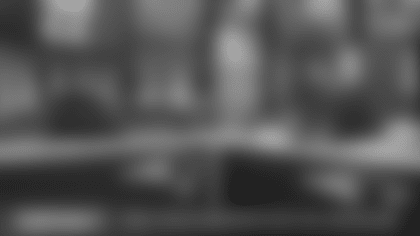Q: Is there any difference in preparing for Jay Cutler versus Matt Moore in terms of what they each bring to the table?
BB: Yeah, I mean, I definitely think there's a difference with all three quarterbacks. You know, Cutler's a very experienced guy, he's got a great arm, he can throw the ball all over the field in any position, so I think that's probably the No. 1 thing is his ability to get the ball anywhere on the field from any type of body position that he's in. You've better be ready to cover everybody. He's a very, very good deep ball thrower and he's got a quick release.
Q: Do you feel like Jonathan Freeny is in a good place in terms of his conditioning after being with a few teams this season?
BB: Well, we're evaluating that this week. So, we'll see. A couple practices and see where we're at today and just figure it out as we go.
Q: Does Freeny give you flexibility in terms of on the line and off the line?
BB: He's done that. Yep, he's done that.
Q: Devin McCourty spoke this week about not taking things for granted in terms of playing in prime time or for a division title. Is he one of the guys in your locker room you would rely on to make sure that message is known?
BB: He would be absolutely at the top of that list, 100 percent.
Q: In what ways have you seen him do that over the years?
BB: He does it every day. Devin just does a tremendous job - the leadership that he's given us, the professionalism, the embodiment of the team and putting the team first, I mean, on every level. I don't know how it could be really much better or any better than what it is. I mean, he does a tremendous job every day from 7 in the morning when things start going here, to our meetings, to our walkthroughs, to the practice field, to the film sessions, to game days, to after the game - the way he handles every situation, he does a great job for us. The leadership he gives us is tremendous. I mean, I don't know what else to say.
Q: That's the kind of the thing you can't really pinpoint through the college scouting and draft process, right?
BB: I think you could identify it at Rutgers, absolutely. I think you could identify it there without question. Now, there and here is two different things, but in that setting, on that team, in that environment, I think he had great leadership. And, again, that's not the easiest thing to do at the corner position. It's easier to have more communication because you're making the calls, because you're kind of - I mean, defense is structured from the inside out, just like everything else is. The center and quarterback and a personal protector and a middle linebacker and a safety - communication works from the inside out, not the outside in. So, the location of his position has facilitated that, but in terms of coming to work every day, being prepared, doing things for the team, helping his teammates out, being a great teammate and all those things - I mean, that's not really position related and all those things are in place. But, defensively, his position has lent itself more to that than corner did, but his rookie year he played corner, went to the Pro Bowl and gave a lot of leadership at that position, as well. I think that's one of the things that you see from a player, whether it be Devin McCourty or Jerod Mayo or Logan Mankins or guys like that that as rookies, they might not be 'the team leader,' but within that group, within that rookie group, they show great leadership. And then a lot of times that second year, as it did with Mayo, as it did with McCourty, the third year with David Andrews, you sometimes see that accelerated jump in leadership and those guys being selected as captains by their teammates, things like that.
Q: With Nate Solder being nominated for the Walter Payton Man of the Year Award, what does he bring to the team, both on and off the field?
BB: A lot. Nate works hard, he's always been a great teammate, a great worker in the weight room and on the field, very diligent, always tries to do his absolute best, whatever you ask him to do. He started off playing right tackle for us and then left tackle. He played a lot of jumbo tight end his rookie year. He's always embraced whatever role it is we've asked him to take on and has done his absolute best with it. I mean, off the field, I think his involvement with his family and what he does in other areas, charitable areas, and with underprivileged children and hospital visits and so forth is exemplary, and that's been well recognized, as well. Yeah, he does a great job.
Q: How are you using the extra day this week before playing on Monday night?
BB: To try to prepare as well as we can. Again, at this time of year, there are a lot of situations. Teams have played 12 games. There's a lot more to cover than there is in Week 3 or Week 4. Not that there isn't a lot then, but just more things have come up. We're doing more things than we did two months ago. They're doing more things than they did earlier in the season. So, the number of variables now becomes exponential as we add 10 things and they add 10 things and now you've got a hundred things and you can't practice a hundred things. Probably the number is a lot higher than that, but anyway, there's quite a bit. So, we have a lot. We have a lot of things to work on, go over, and again, whether we did or didn't play them recently, it doesn't really have too much effect because we have to go back and we all need to review it. I mean, I wasn't thinking about them last week, but now all that has to come back and it all has to be reviewed. You've got to be ready to react to it and handle the variations that come off it, and that comes with preparation that there's no shortcut to it. You just have to do it.
Q: When you're playing on a week day, both teams can still make acquisitions on the day of the game. Does that affect preparation at all?
BB: It could. Yeah, it could. I mean, Saturday is 4 o'clock. So, say it's a 1 o'clock game. You have the night, you have a few hours, but you don't have any practice time. This will be the same thing. I think usually you can, I don't want to say anticipate it - look, I don't think a team's going to sign someone that's not on their roster at 4 o'clock on Monday and play him Monday night. The player would probably come from the practice squad, so it would be an inactive player, which would probably be inactive anyway. And then, if that player was replaced by, again, most likely a player off the practice squad or maybe coming back from IR return or that type of thing, wherever that player came from, but I think you would have an idea of who that player would be. Normally, we include those players into our preparation, so we include - like last time when we played Miami and they brought [Neville] Hewitt up on Saturday, I mean, he was a player that we played against last year. He was a player that was on their practice squad. Did we know they were going to bring him up? No. But were we ready for him to play against us as a potential practice squad player? Yes. We talked about that and we thought he was one of the guys that we've got to be ready for. If they hadn't have brought him up, it wouldn't have changed our preparations. But, when they did, it wasn't like, 'Well, who's this guy?' So, we're aware of those practice squad players.
Q: When you're missing a weapon like Rob Gronkowski, how does that affect your game planning and focus on what the opponent might now try and take away?
BB: Well, every week it's really the same process. You look at your options and put them up against what your opponents do and try to figure it out. Whatever those are - yours are, theirs are or aren't - then that's the process.
Q: Over the course of the year, how often will the quarterbacks perform tackling drills in practice?
BB: Not too often. We talk about it. If a play happens in practice then we finish the play, so if a quarterback threw an interception then after the interception happened the offensive players would react to that. They would run to the interception like they would in a game to be in position to tackle the player who intercepted the pass, which would include the quarterback and all the others. So the number of times that the quarterback tackles is the same number of times that the center does. We don't have tackling drills per se for those players, but on plays like that that happen, a fumble scooped up or an interception, then we would practice the finish of the play just like we would finish it in a game. However many times that happens, that's how many times it would happen. Hopefully, not too many but it does happen and we certainly cover it in training camp when we go through all of those situations about how to do it properly. Not that we want to practice that, but inevitably it will happen and if we cover it properly at least we give the defense a chance to go back out on the field and play defense.
Q: Tom Brady has the most wins in the month of December in NFL history. What do you see from him over the years as the season progresses that allows him to maintain a high level of success as you get later in the season?
BB: Yeah, well, I think that's something for all of us. We all want to play and coach our best football at this time of year. Tom's in that group. So is everybody else. These are the most important games. We're playing for the AFC East championship this week, so you want to play your best and he does. I want to coach my best and I think we all feel the same way about that. Tom is a very competitive guy. He works hard every week. But yeah, when there's a little bit more at stake and the ante moves up I think you compete a little bit harder. You prepare a little bit harder. Tom does a great job playing under pressure and handling big games, if that's what you want to call it. I think that's always been a strength of his.
Q: With Eric Rowe returning from an extended injury absence, are you trying to get his feet wet first with limited playing time before returning him to a bigger role?
BB: I don't know. Not necessarily. However it works out, you want it to work out well for the player. You want it to work out well for the team. Whatever that is depends on the player, his position, the nature of why he wasn't playing and so forth. I don't think there's a set book on how to do it, but I think in the end you want to do what's best for the player. You want to do what's best for the team. Sometimes those two aren't the same. When they're the same - great. If they're not the same then you usually have to do what's best for the team. That's what we all have to do. Sometimes one overrides the other.
Q: Have you noticed any difference with Jordan Richards and his comfort level as the personal punt protector from earlier in the year through now?
BB: Yeah, well, I think it's a little bit different now. When he did it at the beginning of the year when Nate [Ebner] was out the first couple of games in the last preseason game or two - he missed the Detroit game, so whatever it was, a couple of preseason games - we knew, Nate knew, Jordan knew that was Nate's position. Well, Nate's unfortunately not going to be able to play again this year, so it's now Jordan's position. I think it makes it a little bit different. Does he prepare differently? Does he practice differently? No, I wouldn't say, not necessarily, but there's an ownership, there's a confidence at that position. There's certainly a leadership that goes with it that, 'OK, this is now my team.' Not that it wasn't when he was in there. It's a fine line. It is, but it isn't. But again, we knew Nate was coming back and that was going to be Nate's role. Now it's Jordan's role and it's going to be Jordan's role and Jordan knows it and so does everybody else, and I'd say it's a little bit different. But he does a great job with it. Jordan, as he did in the Miami game after the first punt, it was his. He was ready to go. Even though he hadn't had the practice reps on it that he had this past week against Buffalo when we knew Nate was out. Nate got hurt the first punt of the game versus Miami. Jordan stepped in and was ready to go, as you would expect him to be, as he always is, being the professional and the well prepared player that he is.
Q: Have you seen a different level of conditioning from your offensive line this year?
BB: I think they were in good shape last year. I think they're in good shape this year. I mean, we do a decent amount of running and we run after practice. I stand right there when they run and I can feel them run by. I mean, I'm not timing them, but I can feel when they're running fast. I can feel when they're not running fast. I can feel when they're breathing heavy. I can feel when they recover quickly. I think that group, the entire group, not just whether it's Cam [Fleming], or LA [LaAdrian Waddle], or Ted [Karras], whoever. Not just the guys that play but all of them. I think it's a well-conditioned group. I would say they run well. They run well as a group. That's, I think, one of our strongest groups considering their size. They run fast. They run hard. They recover quickly and then they run fast again and run hard again. You don't see that group look like they're struggling to keep up. They more than keep up. I think they've worked hard all year and they're in good shape.



































